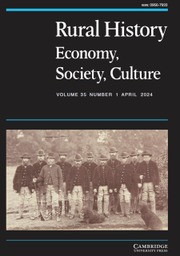Article contents
Farmers’ autonomous management or state regulation? The consolidation of local irrigation associations in Spain (nineteenth to twentieth centuries)
Published online by Cambridge University Press: 12 September 2019
Abstract
The collective management of irrigation is an essential factor in agrarian development, both present and past. However, the relationship of irrigation associations with the state remains underexplored, despite the increasingly important role played by water policies in the modern world. The present article examines this relationship in Spain over the last two centuries. Our results suggest that, first, the state played a decisive part in the emergence and evolution of irrigation associations, and this belies the assumption of the traditional origin of these institutions; second, that farmers, despite being subject to the regulatory framework, enjoyed substantial autonomy in the management of water resources; and, third, that the relationship between local associations and the state changed over time, in response to political regime changes and the transformation of irrigation agriculture. When the state tried to impose authoritarian policies upon irrigation users, these reacted by developing unprecedented forms of organisation.
- Type
- Research Article
- Information
- Copyright
- © Cambridge University Press 2019
References
- 1
- Cited by



